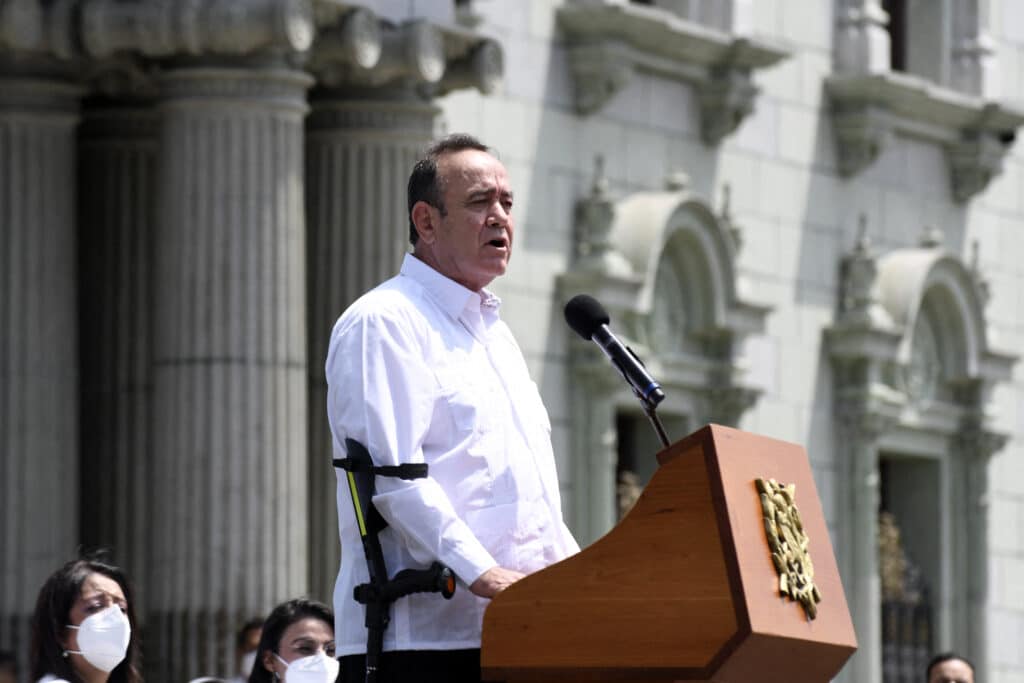Guatemala’s congress U-turns on harsh law banning same-sex marriage after immense backlash

People protest against an anti-abortion and anti-LGBT+ bill outside of the Guatemalan Congress in Guatemala City on 15 March 2022. (ORLANDO ESTRADA/AFP via Getty Images)
In a stunning reversal, lawmakers in Guatemala have shelved a chilling bill that would have banned same-sex marriage and tripled prison time for abortions.
The so-called ‘Life and Family Protection Law’ was passed by a thumping majority in the Congress of the Republic last week on International Women’s Day.
But on Tuesday (15 March), Congress scrapped the bill altogether, the BBC reported. Lawmakers voted once again by a wide margin of 119-19 – but this time to bin the proposed law.
wenty-six lawmakers abstained. News of the law being scrapped ignited waves of cheers from human rights activists outside of Congress.
#Guatemala 🇬🇹 Momentos cuando el decreto 18-2022 fue archivado con 119 votos a favor de esta acción, 19 votos en contra y 26 votos ausentes. Así celebra las mujeres y la diversidad 🎊 con una resistencia de varios días en las calles. @redmmutrans @InfoOTRANS @ObservatorioLam pic.twitter.com/DW2iruXuev
— Agencia Presentes (@PresentesLatam) March 15, 2022
The about-face comes after Guatemala’s president, Alejandro Giammatte, promised to veto the legislation even though his own conservative allies drove it through the legislature.
The measure’s passing raised immediate alarms among women’s rights and LGBT+ campaigners, who have been urging lawmakers to reject it since it was first introduced in 2018.
It would have imposed the harshest penalties for abortion of any country in Latin America and all but paralysed queer rights.
Even though abortion is already illegal in the republic in every case except when a person’s life is at risk, the move would have handed those undergoing the procedure a hefty 10-year sentence, toughening the current three-year jail time.
Even heavier penalties would have been given to doctors and others who assist people in ending pregnancies, seemingly bucking how other Latin American countries such as Mexico have opted to broaden abortion access in recent years.
In doing so, human rights groups warned, lawmakers would drive people to seek abortions in unsafe and potentially life-threatening ways.
Even one of Guatemala’s loudest anti-abortion groups, the Family Matters Association, spoke out against the law which would “put fundamental rights and guarantees at risk”.
The law would have blocked the teaching of LGBT+ identities, relationships and sex in schools. Guatemala’s civil code would also have been tweaked to “expressly prohibit same-sex marriages”.
The proposal said that the “freedom of conscience and expression” should shield people from being “forced to share or participate in non-heterosexual conduct and practices”. “Family” would be strictly defined as “father, mother, and children”.

Guatemalan president Alejandro Giammattei delivers a speech during a ceremony outside the Culture Palace in Guatemala City on March 9. (JOHAN ORDONEZ/AFP via Getty Images)
Giamatti’s distancing himself from the law came only a day following the bill’s passing that he declared the country is the “pro-life capital of Ibero-America“.
He made the comments at the Christian Ibero-American Congress for Life and Family, which brings together anti-abortion and anti-marriage equality conservative groups.
By Thursday, however, he stressed that the proposal “was not sent by the executive”. The law would “violate the constitution” and threaten international agreements signed by the country, he added in a televised address.
Among them, Guatemala is legally bound by the rulings of the Inter-American Court of Human Rights, which in 2018 ruled that same-sex marriage is a human right.
The regional court adheres to the American Convention on Human Rights, to which Guatemala is a signatory.

